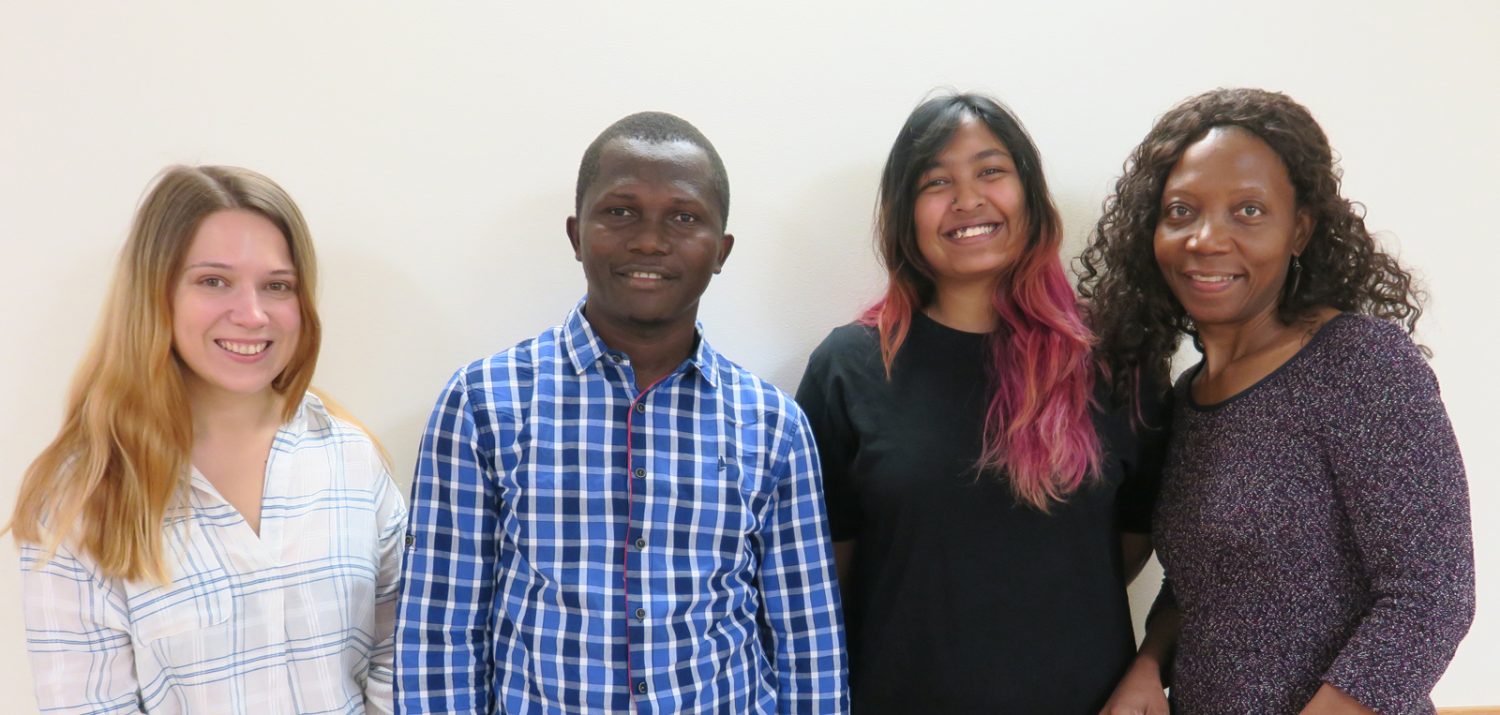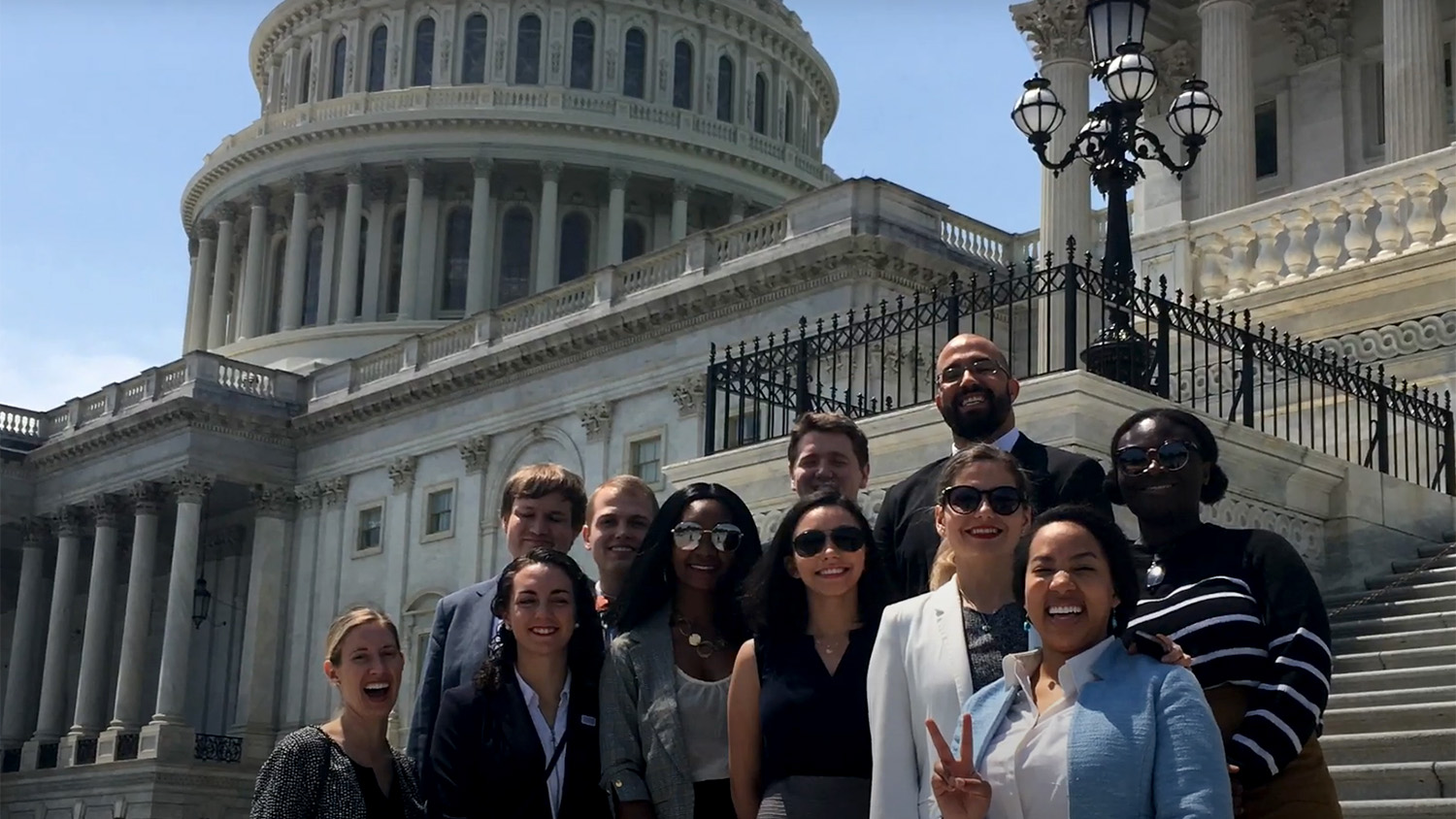Master of International Studies
Broaden your global knowledge. Develop your intercultural communication skills. Prepare for a successful career in international relations.
Program Overview
The Master of International Studies (MIS) is a professional degree program that prepares students for exciting careers in government service, international institutions and non-governmental organizations.
The program combines a core curriculum with a 15-hour regional, topical, professional or technical specialization. Upon graduation, most students move into jobs in government service, nonprofit management, higher education student services and the private sector.
The strength of the program is its diversity of faculty from various disciplines and small class size. The richness of the student body from many countries around the world enhances learning.
Virtual Information Sessions:
Register for one of our Virtual Information Sessions held via Zoom using the links below to learn more about the MIS program. You’ll have an opportunity to hear from faculty, current students, and alumni about the program and learn about the application process.
- Tuesday, February 4, 2025 | 6:00 – 7:30 p.m. (EST)
- Thursday, February 6, 2025 | 9:00-10:30 a.m. (EST)
- This session is specifically geared towards international students. A representative from our Office of International Studies will be in attendance to answer questions about international admission requirements, Visas, etc.
On this page:
Degree Requirements
The MIS is a multidisciplinary, non-thesis degree program that requires 36 credit hours to complete. The 36 credit hours are comprised of 15 credit hours of core coursework, 18 credit hours of specialization/elective coursework, and a 3 credit hour capstone seminar course. Complete program details can be found in the MIS Handbook.
Core Coursework
You must take 15 credit hours of core courses, at least one course from each of the five areas listed below. For course descriptions, please refer to the NC State catalog.
International Relations
- PS 530: Seminar in International Relations
- PS 533: Global Problems and Policies
- HI 554: History of US Foreign Relations
Comparative Politics/Societies
- PS 540: Seminar in Comparative Politics
- PS 541: Political Islam
- PS 542: European Politics
- PS 543: Latin America and the Caribbean
- PS 544: Contemporary African Politics
- PS 545: Comparative Systems of Law and Justice
- PS 546: The Politics of East Asia
- PS 547: Russian Politics
International Law and Organization
- PS 531: International Law
- PS 532: Seminar in Global Governance
- PS 536: Global and Environmental Law and Policy
International Economy/Development
- EC 548: International Economics
- PS 539: International Political Economy
Research Methods
- PS 571 Research Methods
- PA 515 Research Methods
- 500-level methods course from a different department*
- Two GIS (Geospatial Information Science) courses
*You may also take a methods course in another discipline as warranted by your specialization if approved by your advisor in consultation with the MIS DGP. Examples include anthropology, communication, psychology, public administration and sociology.
Specialization Coursework
Students will design their own individualized specialization of 18 credit hours in consultation with their advisor. The specialization can be in a geographical region (e.g., Latin America), an international topic (e.g., environment and sustainable development), a professional field (e.g., public administration), or a technical specialty (e.g., Geographic Information Systems).
The following lists identify examples of possible specialization areas:
Comparative Politics
- PS 540: Seminar in Comparative Politics
- PS 541: Political Islam
- PS 542: European Politics
- PS 543: Latin America and the Caribbean
- PS 545: Comparative Systems of Law and Justice
Europe/Russia
- HI 518: Fascist Italy and Nazi Germany
- HI 519: Modern European Imperialism
- HI 520: European Diplomatic History
- HI 529: 20th Century Britain
- HI 539: History of the Soviet Union and After
- PS 542: European Politics
Latin America
- FLS 525: Poetry and Politics in Latin America
- FLS 592: Seminar in Hispanic Studies
- HI 467: Modern Mexico
- HI 553: U.S.- Latin American Relations Since 1823
- HI 569: Latin American Revolutions in the Twentieth Century
- PS 543: Latin America and the Caribbean
Middle East
- HI 465: Oil and Crisis in the Gulf
- HI 477: Women in the Middle East
- HI 507: Islamic History to 1798
- HI 578: Islam and Christianity in Sub-Saharan Africa Since the 19th Century
- PS 437: U.S. National Security Policy
- PS 541: Political Islam
- REL 408: Islam in the Modern World
- SOC 520: Sociology of Religion
Africa
- PS 541: Political Islam
- HI 575: History of the Republic of South Africa
- HI 576: Leadership in Modern Africa
- HI 578: Islam and Christianity in Sub-Saharan Africa
- HI 579: Africa (Sub-Saharan) in the Twentieth Century
American Politics and Institutions (international students)
- PS 502: The Legislative Process
- PS 506: United States Constitutional Law
- PS 507: Civil Liberties in the United States
- PS 545: Comparative Systems of Law and Justice
- HI 544: US Constitutional History Since 1870
- HI 552: Recent America
- HI 554: History of U.S. Foreign Relations 1900-present
- PS 463: Public Choice and Political Institutions
- PS 437: U.S. National Security Policy
- PA 522: Intergovernmental Relations in the United States
International Law/International Organizations/Global Governance
- PS 431: UN and Global Order
- PS 531: International Law
- PS 532: Seminar in Global Governance
- PS 533: Global Problems and Policies
- PS 536: Global and Environmental Law and Policy
- PS 545: Comparative Systems of Law and Justice
- PS 534: Politics of Human Rights
- PHI 520: Global Justice
- ECG 548: International Economics
International Program Administration
- EAC 540: Foundations of Higher Education and Student Affairs
- EAC 541: Administration and Finance of Student Affairs
- EAC 795: International Higher Education
- EAC 517: Current Issues in Higher Education
- ECD 525: Cross-Cultural Counseling
- COM 523: International & Intercultural Communication
Nonprofit Management
PA 531: Human Resource Management in Public and Nonprofit Orgs
PA 536: Management of Nonprofit Organizations
PA 538: Nonprofit Budgeting and Financial Management
PA 539: Fund Development
PA 510: Ethics and Professional Practices
PA 514: Management Systems
PA 532: Contract Negotiation and Mediation in the Public and Nonprofit Sectors
PA 535: Problem Solving for Public and Nonprofit Managers
PA 542: Public Information Technology
PA 546: Seminar in Program Evaluation
PA 598: Special Topics in Public Administration
PA 640: Grant Writing
COM 546: Nonprofit Marketing and Public Relations
Public Administration
- PA 507: The Public Policy Process
- PA 509: Applied Political Economy
- PA 510: Ethics and Professional Practice
- PA 511: Public Policy Analysis
- PA 512: The Budgetary Process
- PA 513: Public Organization Behavior
- PA 514: Management Systems
- PA 515: Research Methods and Analysis
- PA 516: Effective Communication for Public Administrators
- PA 521: Government and Planning
- PA 522: Intergovernmental Relations in the United States
- PA 525: Organizational Development and Change Management
- PA 530: Financial Management in the Public Sector
- PA 540: Grant Writing for Public Administrators
- PA 546: Seminar in Program Evaluation
Security Studies/U.S. Foreign Policy
- COM 566: Seminar in Crisis Communication
- HI 465: Oil and the Gulf Crisis
- HI 551: The Vietnam War
- HI 553: U.S. – Latin American Relations 1823
- HI 554: History of U.S. Foreign Relations 1900-present
- PS 437: U.S. National Security Policy
- PS 533: Global Problems and Policies
- PS 598: International Security
- SOC 432: Violence, Terrorism, and Public Policy
Sustainable Development
- ANT 531: Tourism, Culture and Anthropology
- ANT 533: Anthropology of Ecotourism and Heritage Conservation
- ECG 540: Economic Development
- GIS 510: Introduction to Geographic Information Science
- NR 571: Current Issues in Natural Resource Management
- PS 533: Global Problems and Issues
- PS 536: Global Environmental Law and Policy
- PRT 795: Sustainability, Poverty and Tourism
Human Rights
- PS 431: UN and Global Order
- PS 531: International Law
- PS 532: Seminar in Global Governance
- PS 533: Global Problems and Policy
- PS 534: Politics of Human Rights
- PHI 520: Global Justice
- PA 536: The Management of Non-Profits
- HI 568: Slavery in the Americas
- PHI 575: Ethical Theory
- SOC 755: Global Institutions and Markets
- COM 562: Communication and Social Change
MIS students can also choose to add a Graduate Certificate to their degree plan. You can find a list of all Graduate Certificates offered at NC State here. The most commonly pursued Graduate Certificates for MIS students are in Policy Analysis, Nuclear Nonproliferation Science and Policy, Nonprofit Management, and Geographic Information Systems.
Additional Requirements
- Capstone Seminar: Students nearing completion of the program are brought together in a 3 credit hour seminar in which they explore broader issues in international studies and write a capstone paper that is presented to other students.
- International Work or Study Experience: American students must have a significant foreign study or work experience of at least 8 weeks by graduation. This may be prior experience or one that is undertaken while enrolled in the MIS program. International students fulfill this requirement by living and studying in the United States while pursuing the program.
- Language Competency: Competency in a foreign language is also required by graduation and is certified by the Department of World Languages and Cultures. Students can meet this requirement by being fluent in a language other than English, taking a fifth semester (300-level) undergraduate language course, or by taking a graduate language certification exam.
A Leading Program

Admission Info
Prospective students apply through the NC State Graduate School. Completed applications include a personal statement, resume, transcripts and three letters of recommendation. Additionally, international applicants must demonstrate proficiency of English.
Please note that we do not require the GRE, nor do we use if submitted.
Application Deadlines
U.S. Citizens
- Fall Applicants: March 1 priority for funding, admission on a rolling basis until June 1.
- Spring Applicants: November 1 priority, admission on a rolling basis until November 25.
International Applicants
- Fall Applicants: March 1
- Spring Applicants: November 1
Internships and Professional Development
As part of our program, you’re encouraged to complete an internship and earn academic credit with an organization relevant to your studies and career interests. Our internship director, Dr. Tracy Appling, will work with you to find the best placement. MIS students have interned across the country and around the world.
Professional development workshops offer opportunities to learn about internships, fellowships and careers. Experts share experiences working in a variety of organizations including the U.S. Foreign Service and other government agencies, international NGOs, the private sector, government contractors, research institutions and others.
Internship Options
Below are a few resources for MIS students searching for full-time and/or internship positions. We also recommend contacting the internship director and utilizing the NC State Career Development Center.
Professional Development Workshops
We offer several professional development opportunities throughout the year. Here’s a list of several upcoming workshops and past events.

Alumni Outcomes
Your career opportunities will be strengthened by the area of specialization you choose within our program.
Our most popular career tracks are in these four general areas:
- Government service at the state and national levels.
- Nonprofit organization administration and outreach.
- Higher education administration in international students services and study abroad.
- International business, primarily trade and marketing.
Frequently Asked Questions
How long will it take to finish the MIS degree? Can I attend part-time?
A full-time course load is 9 credit hours or 3 courses per semester, and the program requires 36 credits. Therefore, it should take 4 semesters if you attend full-time, summer excluded. Credits can be earned for internship and study abroad experiences during the summer that may shorten the time to completion.
The program is also designed to accommodate part-time students. Courses are offered in the late afternoons and evenings. If you are working full time, it is not recommended that you take more than 2 courses per semester.
Do I need to have my language requirement fulfilled before I join the program?
No, the language competency requirement is required to be completed by the time you graduate from the MIS program. It is recommended that you have some foreign language training before entering the program and obtain the appropriate certification either through testing or a course while here on campus. It is difficult to start a language from scratch while also pursuing graduate work in another discipline.
Students can meet with language competency requirement by:
- Completing a 300-level undergraduate language course (typically a fifth-semester course; e.g., Spanish 101, 102, 201, 202, 301),
- Being fluent in a language other than English (most international applicants meet this requirement), or
- Passing a graduate language certification exam offered through the Department of World Languages and Cultures.
How can I meet the international experience requirement?
There are several ways you can gain international experience. If you have had a significant international experience within the last five years prior to entry into the program, it will be counted towards fulfilling this requirement. Otherwise, you may study abroad for a summer or semester, work abroad through your existing job or an internship, or take several extended trips abroad in either a work or study capacity during the course of your program. You may get course credit for study abroad and/or internship.
Can I take courses at Duke or UNC-Chapel Hill?
NC State students can take courses at other institutions in the area, including Duke and UNC Chapel Hill, through interinstitutional registration. You first need to find a course that you are interested in and be sure it is either an advanced undergraduate (400 or better) or graduate-level class. You would then contact the professor of that class to request permission to register. Once that permission is given, you would fill out an interinstitutional registration form, attach the professor’s permission and turn it in to the MIS Director for final approval.
Is financial assistance available?
The MIS program offers a small number of graduate research assistantships. Additional information on these opportunities can be found on our Application Instructions page.



